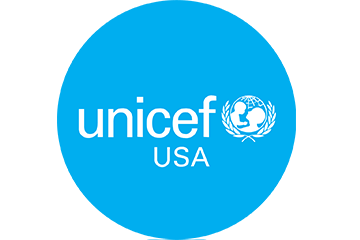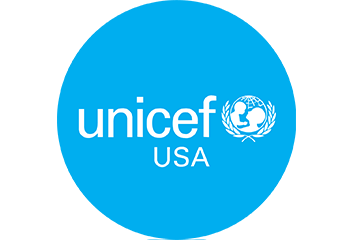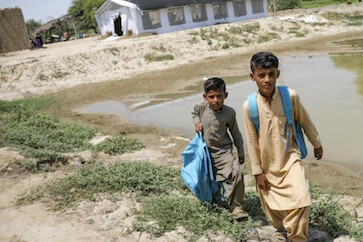In 2021, a pandemic year full of devastating loss and hardship, there were beacons of hope and resilience — frontline health care workers, psychosocial support counselors, empowered youth and others who, in spite of many challenges, continued the fight for a better present and future with support from UNICEF and its partners.
With help from corporate, nonprofit and faith-based organizations, UNICEF was able to advance a number of innovative programs this year — in health, education, gender equality and other priority areas. Partners were particularly instrumental in helping UNICEF work toward more equitable distribution of COVID-19 vaccines as the procurement and supply lead for COVAX.
Some highlights from an impactful year:
Giving young technologists a chance to shine
UNICEF’s Child Friendly Cities Initiative offers a road map for building safe, equitable, just, inclusive and child-responsive cities and communities around the world. Da Nang, Vietnam, is one of those cities that has taken up the charge.
With support from city officials, Fondation Botnar and the International Society for Urban Health, UNICEF organized the 2021 Youth On! Hackathon, a chance for 15- to 18-year-olds to test — and enhance — their technology skills.
Participants were beaming as they reflected on the experience, and how the program taught them to speak up about their ideas and work in teams while learning about contemporary coding and design. “It was an opportunity to express their opinions and aspirations on issues … that concern them,” a key aim of CFCI, said Nguyen Thi Thanh An, Chief of Social Policy and Governance for UNICEF Vietnam.
Van Anh, left, pictured with team mate Minh Trang, reflects on what she learned among other benefits from participating in the UNICEF- and partner-supported 2021 Youth On! Hackathon in Da Nang, Vietnam. “The first thing I learned was team work and how to speak out my ideas,” she said. “Then we learned about coding and design.” © UNICEF Vietnam
Twelve teams participated, along with 18 mentors and facilitators. Each team worked on a project during the competition. The hope, Nguyen said, was that the projects would “have meaningful value-added to adolescents’ learning and well being” — and, more importantly, amplify their passion for innovation and technology.
The hackathon was just one small piece of the Healthy Cities for Adolescents program, an effort to help Da Nang evolve into a healthy, dynamic, and youth-friendly city, and one that encourages adolescents’ active participation in society. The program continues to support opportunities for young people to develop their leadership skills as key stakeholders through training, hackathons, round tables, and other mechanisms to ensure their voices and ideas are heard and prioritized.
Empowering girls and protecting their rights
Zonta International, a UNICEF USA partner since 1972, helped UNICEF reach thousands of adolescent girls in rural parts of Peru this year with improved education and health services. With Zonta’s support, nearly 2,700 adolescent girls have benefited from a reactivation of primary care services, which had been suspended due to COVID–19 pandemic restrictions, and UNICEF was also able to provide technical assistance and training for health personnel to safely resume services at over 400 facilities.
Through the program, rural communities are learning to embrace girls’ rights in other ways too, UNICEF reports. Teachers are rethinking their classroom practices, and schools are adopting “teen-friendly” school plans aimed at preventing pregnancy and gender-based violence.
Zonta has supported many other UNICEF programs over the years. These include key education initiatives in Madagascar and the Global Program to End Child Marriage, through which nearly 8 million adolescent girls have been reached with life skills and school attendance support — all of which help them avoid early marriage and promote gender equality.
In the U.S., Zonta has been an active advocacy partner as well, joining UNICEF USA to push for state legislation banning child marriage with no exceptions, with encouraging results: in 2021, Rhode Island and New York joined Delaware, Minnesota, New Jersey, and Pennsylvania in taking this important step. Zonta and UNICEF USA won’t stop until laws are in place across the country.
Zonta International, a UNICEF USA partner since 1972, supports UNICEF programs in rural Peru and also helps UNICEF USA advocate for U.S. states to ban child marraige with no exceptions. © Zonta International
Improving health and well being of vulnerable mothers and babies
In 2021, UNICEF partner Kimberly-Clark continued its support for programs focused on improving maternal and neonatal health across Latin America and the Caribbean. That support focused on UNICEF’s work in neonatal care, creating baby-friendly environments in hospitals and clinics and training frontline health workers to provide essential service delivery, among other programs.
In 2019 the partners set a goal to save and improve the lives of nearly 2 million babies across 16 countries in the region. Funding support would be generated through the company’s Huggies brand ‘No Baby Unhugged’ initiative. In 2020, over 1 million children received early childhood development (ECD) services as a result of this partnership.
Kimberly-Clark also supports UNICEF initiatives in Vietnam aimed at reducing infant mortality and improving neonatal health outcomes in the central highland provinces and other remote areas of the country.
With support from another partner, Johnson & Johnson (J&J), UNICEF Lebanon was able to expand its reach among vulnerable Lebanese and refugee populations this year — providing much needed services to pregnant and postnatal mothers, adolescent girls and caregivers of children under 5. The J&J-supported efforts in Lebanon are part of a broader partnership initiative launched in 2018, which focuses on building a thriving frontline of global health workers to strengthen health systems and improve access to and quality care in eight countries.
In 2021, with J&J’s support in Lebanon, UNICEF:
- trained 135 health workers in reproductive and maternal health and mental health and psychosocial support
- reached over 4,700 women with essential health and newborn care services, including pre-and post-natal care, immunizations and provision of micronutrient supplements
- counseled over 16,500 pregnant and lactating women on infant and young child feeding, reproductive health and family planning through household visits
Support from partner Johnson & Johnson is helping UNICEF and International Orthodox Christian Charities (IOCC) expand the capacities of healthcare workers to support vulnerable mothers and families in Lebanon. Suzanne Faraj, center left, is an IOCC Community Educational Support Assistant at Karantina public hospital. “Being able to play a role in actively supporting vulnerable families is a great privilege,” Faraj says. © UNICEF
Suzanne Faraj, a Community Educational Support Assistant with International Orthodox Christian Charities (IOCC), another UNICEF partner in Lebanon, joined the UNICEF-J&J team at Beirut’s Karantina public hospital in April 2021. She provides mothers with information about breastfeeding and nutrition at no cost — work she acknowledges helps combat the stress of living in Lebanon, which is still reeling from the effects of the August 2020 port explosion.
“Being able to play a role in actively supporting vulnerable families is a great privilege,” Faraj says. “Knowing that I am well-equipped to help them and to see how we’re improving the quality of so many mothers’ and babies’ lives gives value to my own life.”
Working toward COVID-19 vaccine equity — and vaccine confidence
In addition to empowering youth through technology training and reducing gender inequality, UNICEF and partners have made significant progress in the historic fight against COVID-19.
Nearly two years on, the pandemic continues to be an unprecedented health, socioeconomic and human rights crisis, taking its toll on the most vulnerable: as of Dec. 15, more than 270 million COVID-19 cases and over 5.3 million deaths had been reported.
Since COVID-19 vaccines have become available, UNICEF and partners have been delivering doses to countries in need — over 720 million to 144 countries as of this month — while also providing rapid diagnostics, effective treatments and other critical supplies and support to help end the pandemic and shore up country health systems.
Committed to addressing vaccine inequities, UNICEF is focused on increasing vaccination rates in low-income countries. Through in-country community engagement, UNICEF is also combatting the spread of vaccine misinformation to boost vaccine acceptance.
There are many corporate partners supporting this critical work: Clarios Foundation, Google.org, Kimberly-Clark, Prudential Financial and S&P Global Foundation, to name some. Two faith-based organizations also stepped up this year: Latter-day Saint Charities and the Islamic Food and Nutrition Council of America (IFANCA).
UNICEF partners with religious communities of all faiths to help children survive and thrive around the world. As agents of change, religious leaders and faith actors have been pivotal in UNICEF’s communication and advocacy strategies.
A major donation announced in February from Latter-Day Saint Charities, a longtime funder of UNICEF health, education and early childhood development programs, helped finance UNICEF’s vaccine procurement and distribution, as well as the provision of personal protective equipment, with the first wave of COVAX shipments and as vaccinations began for frontline health workers. That support enabled UNICEF to disseminate information, to counter mistrust and hesitancy, and to convey to communities ways to prevent the virus from spreading.
The move inspired other faith-based organizations to join the fight as part of the Interfaith Movement to End the Pandemic, helping to rally support for vaccine equity in alignment with UNICEF’s mission and addressing vaccine misinformation within their own communities. IFANCA, for example, recently hosted a webinar in partnership with American Muslim Health Professionals, during which group leaders encouraged members of Muslim communities in the U.S. to get vaccinated.
IFANCA is also helping to build vaccine confidence through the halal certification of vaccines while promoting transparency and trust around vaccine information. Mindful that boosting vaccination rates among eligible students, teachers, staff and household members is critical for schools to reopen safely, IFANCA hosted a “Back to School & Vaccines” Q & A with Dr. Anthony Fauci (Chief Medical Advisor to President Biden) as a way to guide parents, students and teachers transitioning into a new school year.
Recipients celebrate the arrival of COVID-19 vaccine doses in Malawi. UNICEF partner Latter-Day Saint Charities helped fund UNICEF’s efforts to end the pandemic as head of vaccine procurement and supply for COVAX. © UNICEF
UNICEF has expanded its funding appeal to $969 million as it continues to scale up efforts to deliver vaccines to countries in need to close equity gaps and to increase adoption and trust in vaccines.
No one is safe until everyone is safe from the virus. Together, UNICEF and its partners will keep going, to end the pandemic while also continuing other essential work: investing in youth through education, empowering girls, caring for the physical and mental health of young mothers and babies among other mission pillars.
The needs of children and families don’t stop during a pandemic — and neither will UNICEF and its partners.
Top photo: UNICEF relies on partners to fulfill its mission delivering for children in need all around the world, like these students at White River School in Honiara, in The Solomon Islands. © UNICEF/UN062233/Sokhin





